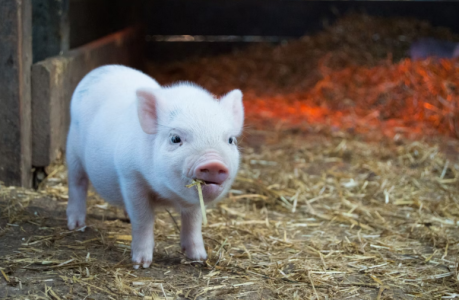Medical milestone: World’s first pig lung transplant successfully carried out
- Replies 0
Medicine has always pushed at the edge of the possible, testing where science ends and miracles begin. Across the world, researchers are racing to find answers for patients who have run out of options.
In hospitals and laboratories, new frontiers are opening through genetic engineering and bold surgical techniques.
The latest breakthrough signals both promise and caution, as doctors take another step toward reshaping the future of transplants.
A 39-year-old man in China became the first person to receive a lung from a pig, marking a milestone in medical research.
The procedure, performed at the First Affiliated Hospital of Guangshou Medical University, was designed to test how a genetically modified organ would respond inside the human body.
The donor lung came from a pig altered with six genetic edits created by Chengdu Clonorgan Biotechnology, a company specializing in organ engineering.

Doctors hoped the trial would reveal whether the lung could resist the immune system’s tendency to reject foreign tissue.
Although the patient had been declared brain-dead after a cerebral hemorrhage, the transplant offered scientists a rare chance to observe how the organ functioned in real time.
For nine days, the lung survived inside his body, showing resilience despite early swelling and antibody attacks.
Also read: Breakthrough surgery revealed: How a pig’s liver may change the future of human transplants
By day nine, signs of rejection had actually decreased, surprising researchers who had expected the damage to worsen over time. The trial was concluded when the man’s family requested the study be ended.
Throughout the monitoring period, the transplanted lung showed no major infections and continued to provide data on how such organs behave under human immune pressure.
Researchers reported their findings in the journal Nature, describing the results as encouraging but cautioning that obstacles remain.
Unlike kidneys or livers, lungs are among the most difficult organs to transplant, since they are highly vulnerable to immune responses. This made the experiment a particularly significant proof of concept in xenotransplantation.
International experts have taken notice, including Dr. Muhammad Mohiuddin of the University of Maryland School of Medicine, who led the world’s first pig heart transplant into a living patient in 2022.
He praised the work as an important first step, while reminding that lung transplants remain uniquely challenging. Even with genetic modification, the risks of rejection and infection cannot yet be fully controlled.
Also read: A groundbreaking medical discovery is making waves—could this be the next big leap in medical innovation?
Still, he called the achievement a necessary milestone on the long path toward future clinical use. The broader field of pig-to-human transplants has been advancing quickly, with trials for liver and kidney procedures already green-lit in the United States.
This experiment stands out because lungs are seen as the final barrier in transplant science, requiring innovations in both genetic engineering and immune suppression.
While the trial was short-lived, it demonstrated that carefully edited pig organs may one day provide new hope to patients dying while waiting for donor matches. For families facing the devastating reality of organ shortages, that future could not come soon enough.
Read next: Can an organ donor kill you? The shocking Arizona case that will change how you see transplants forever!

Would you feel comfortable knowing a loved one could one day receive a life-saving organ grown from an animal, or do you think the risks outweigh the possibilities? Share your thoughts below and let’s explore what this future could mean for medicine and society.
In hospitals and laboratories, new frontiers are opening through genetic engineering and bold surgical techniques.
The latest breakthrough signals both promise and caution, as doctors take another step toward reshaping the future of transplants.
A 39-year-old man in China became the first person to receive a lung from a pig, marking a milestone in medical research.
The procedure, performed at the First Affiliated Hospital of Guangshou Medical University, was designed to test how a genetically modified organ would respond inside the human body.
The donor lung came from a pig altered with six genetic edits created by Chengdu Clonorgan Biotechnology, a company specializing in organ engineering.

World’s first pig lung transplant successfully carried out. Image source: Christopher Carson / Unsplash
Doctors hoped the trial would reveal whether the lung could resist the immune system’s tendency to reject foreign tissue.
Although the patient had been declared brain-dead after a cerebral hemorrhage, the transplant offered scientists a rare chance to observe how the organ functioned in real time.
For nine days, the lung survived inside his body, showing resilience despite early swelling and antibody attacks.
Also read: Breakthrough surgery revealed: How a pig’s liver may change the future of human transplants
By day nine, signs of rejection had actually decreased, surprising researchers who had expected the damage to worsen over time. The trial was concluded when the man’s family requested the study be ended.
Throughout the monitoring period, the transplanted lung showed no major infections and continued to provide data on how such organs behave under human immune pressure.
Researchers reported their findings in the journal Nature, describing the results as encouraging but cautioning that obstacles remain.
Unlike kidneys or livers, lungs are among the most difficult organs to transplant, since they are highly vulnerable to immune responses. This made the experiment a particularly significant proof of concept in xenotransplantation.
International experts have taken notice, including Dr. Muhammad Mohiuddin of the University of Maryland School of Medicine, who led the world’s first pig heart transplant into a living patient in 2022.
He praised the work as an important first step, while reminding that lung transplants remain uniquely challenging. Even with genetic modification, the risks of rejection and infection cannot yet be fully controlled.
Also read: A groundbreaking medical discovery is making waves—could this be the next big leap in medical innovation?
Still, he called the achievement a necessary milestone on the long path toward future clinical use. The broader field of pig-to-human transplants has been advancing quickly, with trials for liver and kidney procedures already green-lit in the United States.
This experiment stands out because lungs are seen as the final barrier in transplant science, requiring innovations in both genetic engineering and immune suppression.
While the trial was short-lived, it demonstrated that carefully edited pig organs may one day provide new hope to patients dying while waiting for donor matches. For families facing the devastating reality of organ shortages, that future could not come soon enough.
Read next: Can an organ donor kill you? The shocking Arizona case that will change how you see transplants forever!
Key Takeaways
- A brain-dead man in China became the first to receive a genetically modified pig lung, which survived nine days inside his body.
- The lung was engineered with six genomic edits by Chengdu Clonorgan Biotechnology and showed no signs of infection during monitoring.
- Researchers reported swelling and antibody attacks in the early days, but rejection appeared to lessen by day nine before the study was ended.
- Experts, including Dr. Muhammad Mohiuddin, praised the trial as a crucial first step in lung xenotransplantation, though major risks still remain.






